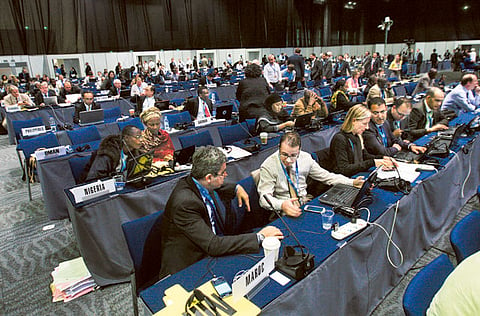New UN telecoms treaty signed in Dubai
140 countries out of 152 to agree new regulations

Dubai: About 140 countries out of the 152 that took part in the World Conference on International Telecommunications 2012 (WCIT) are expected to sign the new international telecommunications regulations in Dubai on Friday.
The new agreement will come into effect in January 2015. The treaty was last updated in 1988 in Melbourne, Australia.
An agreement to update 24-year-old regulations was approved against the opposition of countries including the US, Canada, Australia, Philippines, India, Costa Rica, Serbia, Finland, Italy, Spain, Greece, Portugal and the UK, whose officials walked out on the talks on concerns about internet regulation and censorship.
Some countries wanted to talk to their national consultancies before deciding to sign the treaty.
According to Dr Hamadoun Toure, the Secretary-General of the ITU, those countries who did not sign the treaty, their citizens will be deprived of the benefits of the new treaty.
The countries who did not sign the new treaty till 2015 will continue to be bound by the 1988 version.
“I was happy that all the regional groups and the administrations worked together in a spirited compromise to produce the final text. The final text was also approved by the opposing countries and does not include internet or content issues,” Mohammad Al Ganim, Director General of Telecommunications Regulatory Authority, UAE, and Chairman of WCIT 12.
The new agreement will give countries a right to access international telecommunications services and the ability to block spam, which delegations declining to sign the amended text argued would pave the way for government censorship and control over the internet.
Statements made by many delegations are very clear that internet issues did not belong in the ITRs and that they would not support a treaty that is inconsistent with the multi-stakeholder model of internet governance.
“The treaty will not limit freedom of expression and will mostly seek ways to broaden internet services to developing countries,” Toure said.
“The new ITR treaty does not cover content issues and explicitly states in the first article that content-related issues are not covered by the treaty. Likewise, in the preamble of the new text signatory Member States undertake to renew their commitment and obligation to existing human rights treaties,” Touré said.
The new treaty contains many gains and achievements including increased transparency in international mobile roaming charges and competition, greater connectivity for people with disabilities, increased investment and roll out of broadband and mobile broadband and promoting greater energy efficiency.
During the past 24 years, the internet has been running without UN regulations, said Terry Kramer, head of the US delegation.
“We candidly cannot support an ITU treaty that is inconsistent. US still believes that internet policy should be multi-stakeholder driven and should not be determined my member states, but by citizens, communities and broader societies.
“This has not happened here. We came to the conference on hopes of finding ways for cooperation and collaboration in the telecommunications arena. We are very disappointed by this conference.” Kramer said.
“My delegation came to work for revised international telecommunication regulations, but not at any cost,” said the head of the UK delegation Simon Towle.
Sign up for the Daily Briefing
Get the latest news and updates straight to your inbox


